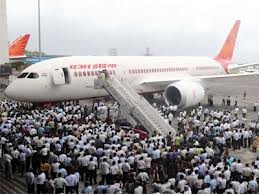New Delhi, Oct 7: Under attack from the Opposition, including the Left, for his remarks that Government was ready to privatise Air India, Civil Aviation Minister Ajit Singh today backtracked saying it has "no intention" to do so.

"This government has no intention to privatise Air India. After this package of Rs 32,000 crore, the government will not give any more money. Air India will have to fend for itself," Singh told NDTV.
While noting that it is very difficult for the government to run a service industry, Singh also said that employees and the management of Air India will have to understand that aviation is a very competitive market.
"The margins are thin and it's a capital intensive industry," the minister said.
The change of stand by the Union Minister came amid mounting pressure by the Opposition parties, which took strong objection to his earlier remark and accused him of selling public asset without bringing a civil aviation policy.
Warning the Minister against making any "off-the-cuff" remark, senior BJP leader Ravi Shankar Prasad said there must be a proper discussion on the issue.
"It is a serious and sensitive issue. There must be proper discussion within the government first and thereafter the views of the opposition needs to be taken," he told reporters here when asked to comment on Singh's remarks.
Asking the government not to take a "disastrous move" which will go against national interest, senior CPI leader D Raja said the government had promised to bring a civil aviation policy but did not do it in so many years.
"It is undertaking privatisation in bits and pieces without taking Parliament into confidence.
"While equity was not being infused in AI in accordance with the turn around plan, Airports Authority of India (AAI) was also being systematically undermined. This is a conscious effort to dismantle both these public sector undertakings," the CPI National Secretary said.
Raja said it was also "atrocious" that six airports including Kolkata and Chennai were being privatised soon after AAI has spent rupees thousands of crores of public money to modernise and upgrade them.
Maintaining that general elections were on the anvil, he said these decisions should be taken by the new government after the elections.
"What moral right Ajit Singh has to take such decisions on behalf of the next government," he posed.
Noting that the government had released Rs 5,000 crore instead of the earmarked Rs 8,745 crore to Air India in the last fiscal, Raja said the remaining amount was not given.
"Even the amount allotted for this financial year has not been released," he said.
Observing that privatisation was not a panacea for all evils, he said Kingfisher Airlines has shut down and there were several other private airlines which had closed shop in the early 90s.
He said private airlines also owe enormous dues to AAI.
CPI(M) MP Tapan Sen accused the government of performing "anti-national activities" by considering privatisation of Air India. "The UPA government is politically inclined to sell the country," he charged.
After spending over Rs 5,000 crore to modernise some 40 airports, it is handing over the management of these airports to private parties on a revenue sharing basis.
So, by making any investment the private parties will earn profits and the government will get only a part of the revenue after spending so much money.
On AI, he said government was going in the same direction. First, you make it bleed and then you sell it off saying it is not performing, he said.
Both Raja and Sen said they will oppose such moves tooth and nail.
Denouncing the Civil Aviation Minister's statement, CPI(M)-affiliated trade union Centre of Indian Trade Union reminded him that Air India belonged to the nation and was not the property of council of ministers.






Comments
Add new comment